Even the most enthusiastic Labour supporter cannot fail to be dismayed by today’s revelation that the York Council considered issuing “fudged” figures to potential care village bidders.
But it is simply the latest in a string of mistakes that has eroded the trust that residents have in their local authority.
The Lowfields Care Village project fell foul of a system which has encouraged a series of over ambitious “mega projects”.
At a time when the Council’s management structures were being cut back, leading Councillors failed to recognise that the system had broken under the strain.
They failed to get answers to key questions in a timely way
Not only is York’s social care system now breaking down, but another project – to turn the Guildhall into a Digital Media centre – has produced fresh calls for a public inquiry.
Local experts have poured scorn on rental income assumptions for the serviced workstations proposed for the site.
When the item was “called in” earlier in the month for review, business plan assumptions were only displayed via a projector, giving Councillors no chance to evaluate them.
If the business case is flawed, then nearly £500,000 of taxpayers money (out of a potential £9.2 million total cost) is already at risk as the project moves to its next stage.
So there is growing evidence that this business case has also been “fudged”.
So what next?
There are Council elections on May 7th and a record number of candidates (over 200) are likely to be seeking votes. Most have now declared themselves and are beginning to actively canvass for support.
The prosperity of our City depends on having a team of able Councillors with a mix of life and work experiences.
Most of the failed Cabinet decisions can be put down to a system which prevents debate and which encourages secrecy.
That needs to be changed, with the traditional “committee system” being the obvious alternative.
Failing that, Cabinet membership should be restricted to Councillors with at least 5 years experience.
On May 7th, electors will need to look beyond the headline policies and seek out the hidden – potentially unpopular – promises which may be hidden in the manifesto small print.
Hardly anyone noticed in 2011 that Labour intended to introduce wide area 20 mph speed limits – but the policy was there, on the Labour web site, albeit in the small print.
Most of all voters will, on May 7th, need to look beyond party labels and ask who would be the best representative for the ward and for the City?
Who has the best blend of skills, experience and a track record in the local neighbourhood?
Then there is the culture issue that the York Council faces.
Some changes have been made in the months since the Council became “balanced”. But more needs to be done.
The writing was on the wall from the day when the new Labour Cabinet took office in 2011. Cllr Alexander apparently told the Chief Executive that her job targets were to implement the Labour manifesto.
That attempt to politicise officials may be partly responsible for the attempts that are still being made to suppress information and use the Councils press office to “spin” bad news stories.
That has to stop when the new Council takes over in May.
It is difficult also not to conclude that, to convince residents that a new start is being made, a refresh of the Councils management team should be undertaken.
Council officials are normally proud of their political impartiality.
This is now more in question in York than at any time since the late Rod Hills appointed two former Labour Councillors to Chief Officer posts when he had control of the Council.



 People will join together with over 400 other residents from York in the switch, which could help them save on their gas and electricity bills.
People will join together with over 400 other residents from York in the switch, which could help them save on their gas and electricity bills.